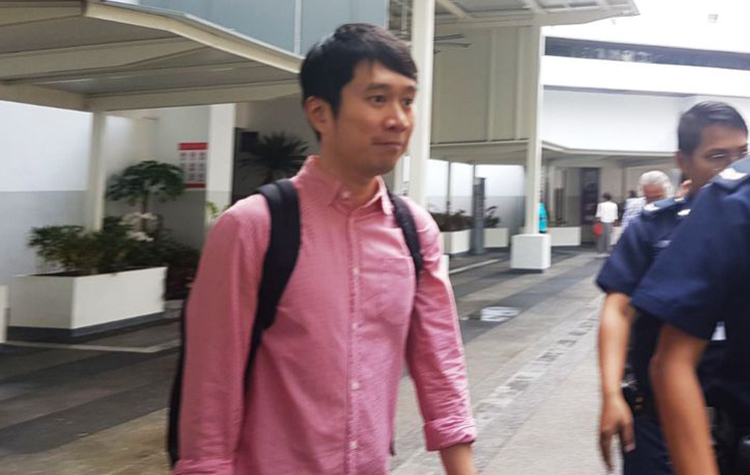(8 December 2017, Bangkok) – The Asian Forum for Human Rights and Development (FORUM-ASIA) strongly condemns the judicial harassment by Singaporean authorities of Jolovan Wham, a pro-democracy civil rights activist. The Attorney-General’s Chambers brought seven charges against Jolovan Wham at the district court level. Among others, he was accused of having violated the Public Order Act by organising a public assembly without a permit.
For years, the draconian Public Order Act has been criticised by civil society organisations across the region for its repressive elements, which have been used to silence the voices of dissent and to crackdown on activities of civil society organisations in Singapore. The law requires organisers to obtain a police permit prior to conducting a public assembly or procession.[1] Not complying with this requirement is punishable by fines of up to 3,715 US Dollars.
On 29 November 2017, Jolovan Wham was charged with seven alleged offenses, specifically three for organising public assemblies without a permit, three for refusing to sign statements to police, and one count of vandalism.[2]
The charges stem from three public gatherings he organised. The first one was on 26 November 2016, when Joshua Wong, a prominent pro-democracy activist from Hong Kong, spoke through Skype at an indoor forum on civil disobedience and social movements. Jolovan Wham was charged for failing to obtain a permit for involving a non-Singaporean speaker, as obliged under the Public Order Act.
The next gathering was a silent protest on 3 June 2017 to commemorate the 30th anniversary of the crackdown on social activists in 1987. Jolovan Wham, along with eight other activists, stood blindfolded on a Mass Rapid Transit (MRT) train. Later, as a symbolic act, they silently sat in the MRT reading a book about the anniversary of the 1987 incident. Even though the gathering was peaceful, Jolovan Wham again was charged for failing to obtain a permit and additionally charged for vandalism, as he had taped two sheets of paper calling for ‘justice for 1987 incident and opposing detention without trial’ on the inside of the train.
The last gathering was a candlelight vigil held outside Changi Prison on 13 July 2017. Jolovan Wham was one of the organisers of this small public gathering to support the family of Srivijayan Prabagaran, who was convicted for drug trafficking and consequently sentenced to the death penalty.
The various charges brought against Jolovan Wham constitute judicial harassment aimed at stifling his political dissent. All three activities were peaceful, and did not cause any public disturbance, nor did they damage or deface any property. According to Article 21 of the International Covenant on Civil Political Rights (ICCPR), such gathering should be presumed lawful and not be restricted by any requirement of needing to apply for a permit, in recognition of the right to peaceful assembly.
Since its imposition in 2009, the Public Order Act has been used to forbid any form of gathering deemed a public meeting with a political purpose. According to the Act, the Commissioner of Police may refuse to grant a permit for a public assembly on the ground of concerns for public disorder, public nuisance or similar disturbances. It is phrased ambiguously, which provides room for authorities to cancel any public assembly deemed too political. The restrictive provision does not align with international law principles of necessity and proportionality.
It is a fundamental obligation for a civilised-democratic country to guarantee the rights and freedoms of its citizens, including the freedom of peaceful assembly. The Singaporean Government should recognise this and facilitate the peaceful assembly of all who wish to do so. It should also abandon all attempts to harass or criminalise any individual who exercises these rights, including in the case of Jolovan Wham.
During the second Universal Periodic Review (UPR) cycle, the Singaporean Government said, ‘Our laws allow our citizens to enjoy the right to freedom of expression and peaceful assembly, while protecting the larger public interests of preserving public order and security.’ In line with that, the Alliance of Like-Minded Civil Society Organisations in Singapore (ALMOS) encouraged the Government, through its recommendation Number 21 in the UPR report, ‘to conduct a holistic review of all the laws that can potentially restrict freedom of expression, with the intention of protecting the right for free expression by media and citizens.’
FORUM-ASIA calls on the Singaporean Government to immediately and unconditionally drop all charges against Jolovan Wham. His right to exercise his fundamental freedoms should not be criminalised. The Singaporean authorities should stop penalising the legitimate practice of freedom of assembly and enable a safe environment for peaceful assembly through an amendment to the Public Order Act. FORUM-ASIA also demands that the Singaporean authorities safeguard all voices in society by protecting the freedom of expression, freedom of assembly and association and all related civil and political rights. As Singapore will take over as the Chair of Association of Southeast Asian Nations (ASEAN) next year, FORUM-ASIA expects the Government to take concrete steps to recognise the fundamental freedoms of its people, including the freedom of peaceful assembly.
***
For a PDF version of this statement, please click here.
For further information, please contact:
– East Asia Programme, FORUM-ASIA, [email protected]
[1] Article 7, Public Order Act 2012.
[2] http://www.todayonline.com/singapore/civil-activist-jolovan-wham-charged-court




